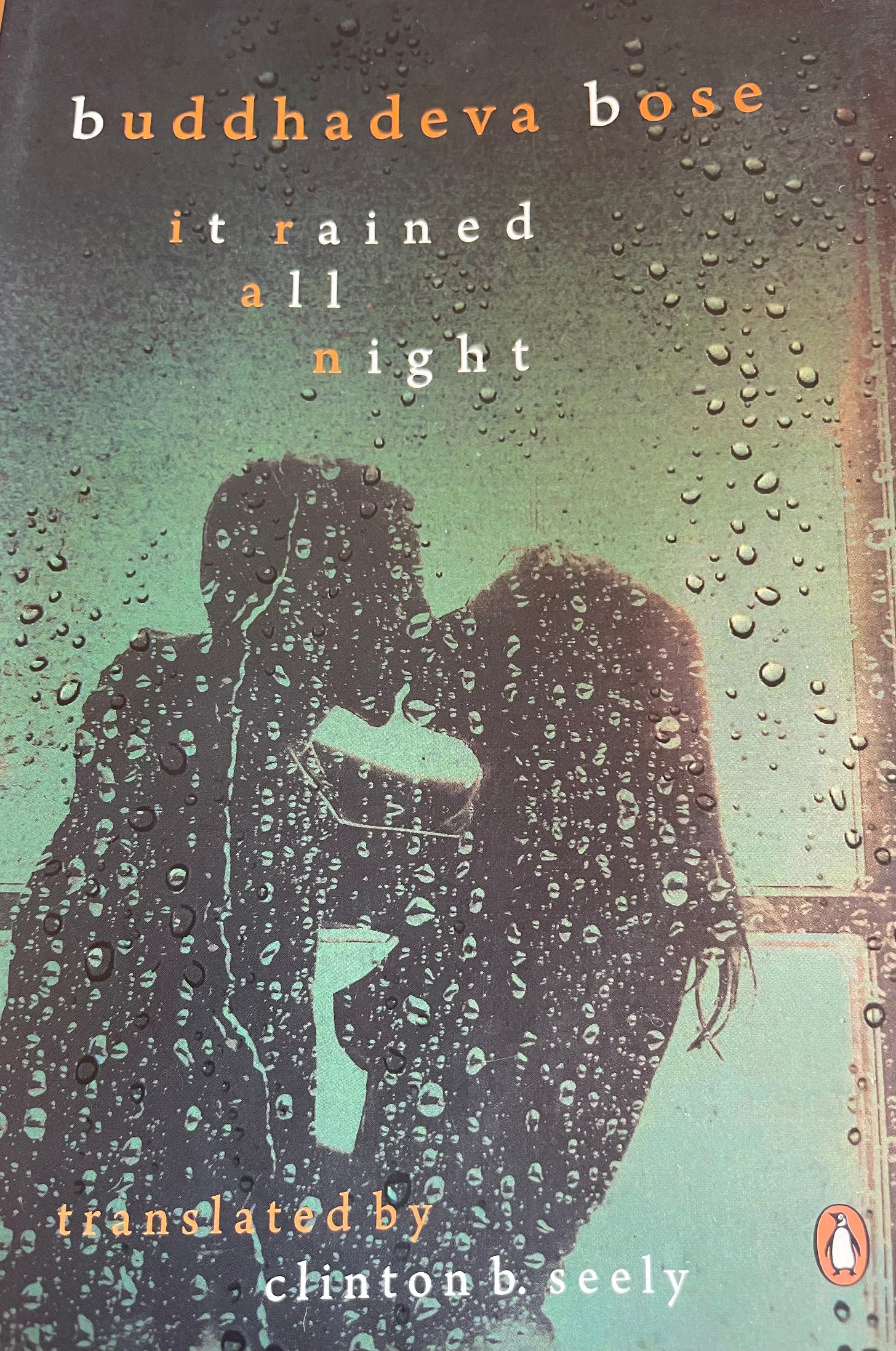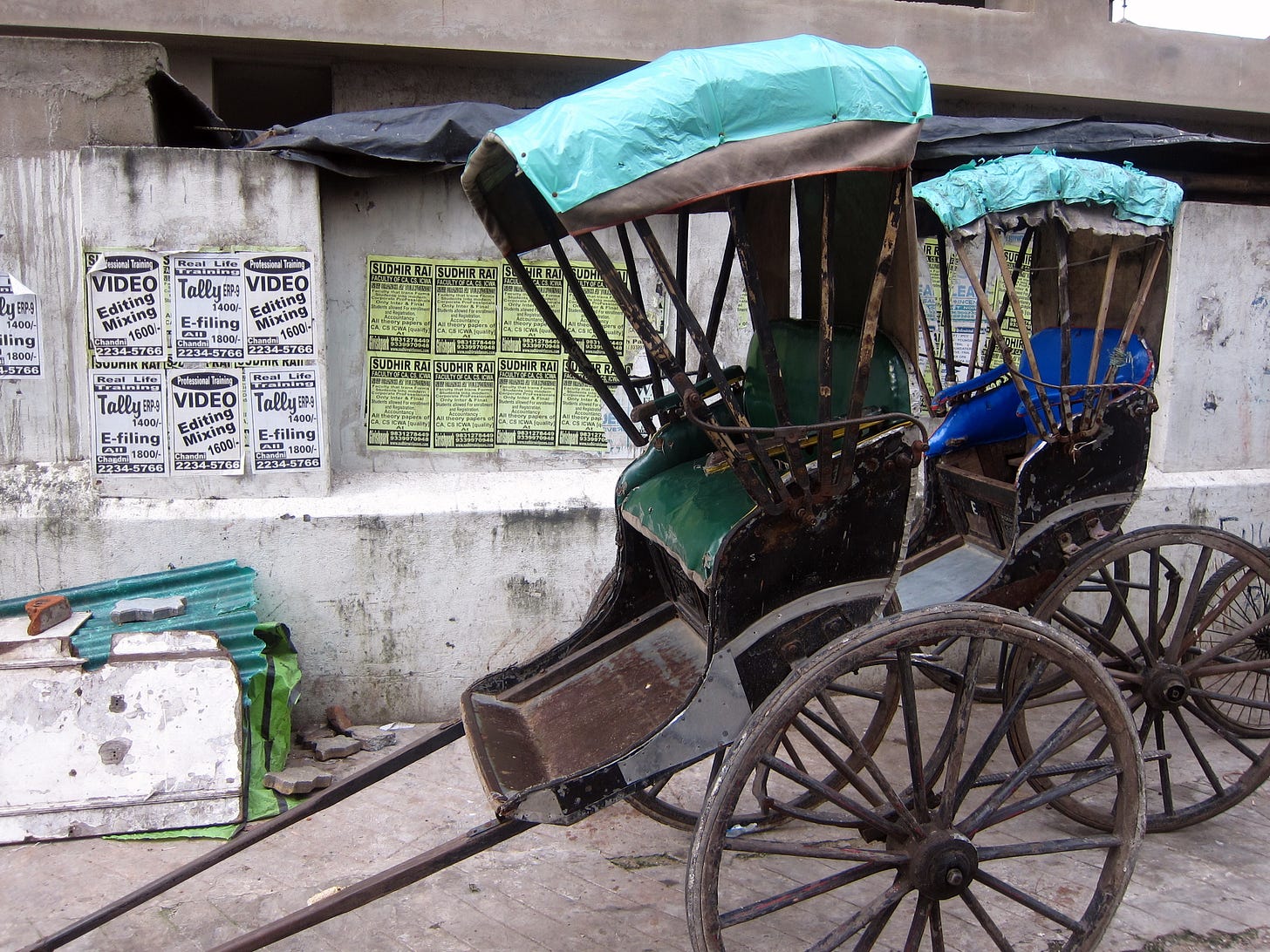A BOOK ONCE BANNED
This elegant Bengali novella takes us into the heart of a marriage. We watch the marriage unravel scene by scene until there's nothing more to be said and we see how it must end.

This week I read It Rained All Night for a second time. It had made a deep impression on me a few years ago when I first read it. At the time, I’d wanted to shout out the name of this Buddhadeva Bose novella from the rooftops. It’s a book with zero artifice, no stylistic flourish and no digressions whatsoever. Its storytelling is matter-of-fact and it manages to let us in on the perspectives of the two main characters, Nayonangshu and Maloti. Sometimes it switches to the voice of an omniscient narrator. The novella begins with Maloti’s voice.
It’s over—it happened—there’s nothing more to say. I, Maloti Mukherji, someone’s wife, and someone’s mother—did it. Did it with Jayanto. Jayanto wanted me and I him. Perhaps Nayonangshu thinks we did it before, but no—tonight was the first time. Tonight—four hours ago. On this bed. Where I’m now lying.
Ah, with that nuclear blast of an opener, it is impossible to not want to keep on reading this work. It Rained All Night is a story about an attractive middle-class Bengali woman named Maloti who marries into a conservative, orthodox family. Maloti marries her own college professor Nayonangshu only to find him sexually timid and unable to satisfy her as the days roll on. Nayonangshu is clearly a romantic, but he is more in love with the idea of being in love; he’s never totally in the moment even though he finds his wife very desirable. Yet when he is in the bedroom with Maloti, he might as well be inside a lecture hall applying his textbook knowledge of love and lovemaking. In the first flush of love, Maloti makes excuses for his behavior. As time goes on, however, it dawns on her that he is a narcissistic cad who cannot see beyond the end of his nose. Maloti begins to find her husband repulsive and hypocritical, too.
Her husband wants her—and why shouldn’t he?—but she dislikes Nayonangshu’s stubby little fingers. She detests the smell of his breath. She shivers at the very thought of lying close to his body. Just to have his hand touch her makes her shudder. What can Maloti do? It’s like that involuntary “ooh!” you give out when you’re pricked with a pin.
Early on in their marriage, when she wants to live in the comfort of their joint family among all his family members, he tells her that, instead, he wants to move to their own place. He lectures her on building their own identity. Once they’re in their own home, however, his attitude changes with respect to Maloti. The independence she thought he wanted for her is non-existent. It’s clear that she can be independent only as long as she plays by his rules. It’s apparent that the identity he wanted for her was his version of it, not hers.
But then some other occasion would arise and he’d repeat the same thing, the essence of which was that something or the other, this action or that ‘didn’t please him’. Which meant, of course, that Nayonangshu wouldn’t let me be what others would have liked me to be, that he’d refashion me according to his liking. I was not to be moulded in someone' else’s image, but only his—that was what my so-called ‘individuality’ amounted to.
Once they’re in their own home, Nayonangshu also converts his home into a literary salon or an adda center. He invites his colleagues in the world of literature to his home every evening for a discussion over cigarettes. Day after day, writers and thinkers congregate in his home and Maloti is expected to serve and also become part of the social crowd. The sessions run late into the night, sometimes after Maloti has gone to bed. Nayonangshu believes these meetings with men will make women more interesting and less circumscribed by kitchen and hearth.
Soon enough, the men who arrive at the adda salon begin to find Maloti as interesting if not more engaging even than Nayonangshu. Some, it’s obvious to all, come mainly to spend time with her. One of the men who arrives to participate in the daily meetups is a married man called Jayanto whose penurious circumstances have not come in the way of his passion or his drive to sustain his struggling publication.
Maloti and Jayanto become friends. Jayanto becomes a fixture in their home. As Nayonangshu watches her sway over his friends, he becomes resentful. Maloti feels alienated from her husband with the result that with the passing years, she finds solace elsewhere. She discovers a kindred spirit in Jayanto for he is confident and pragmatic, and his love offers her a distraction from the demands of her wifely duties.
Within a few days it became evident that Jayanto was more interested in me than in Nayonangshu. He didn’t try to conceal it at all. No pretences whatsoever—on every occasion he’d make it clear that he was showing up daily at this house because of me. Sometimes he’d come over in the morning, just when Nayonangshu was about to leave for office—he’d settle comfortably into a sofa and say, “Okay Mr. Mukherji, you go to office—I don’t have a job or I’ll just sit a while with the lady.”
Maloti and Jayanto’s growing intimacy does not go unnoticed by Nayonangshu, but his pride restrains him from reaching out to his wife. Given that Nayonangshu once asked his wife why women could not have platonic relationships with male friends, he is unable to cast aspersions on her character when she spends a lot of time with Jayanto in their living room.
In time, both Maloti and Jayanto realize that what they feel for each other is different. In Jayanto, Maloti finds a man who listens to her and is on an equal footing. Jayanto is unable to hide his feelings from Nayonangshu. The day Maloti’s child falls ill, it’s Jayanto who understands Maloti’s plight right away and figures out how exactly to go about getting her child seen by a local doctor.
This story of a love triangle is all too common, of course, and it has been narrated and play-acted for centuries. Yet this book has a fiery quality. It is brave. It doesn’t try to philosophize. The book’s brilliance, especially given the time during which it was published, is contained in its bold rendition of male and female desire.
The body is the main component of love—the beginning, the end, everything’s the body. Why do middle-aged husbands and wives squabble and bicker? Because their bodies are dead. Revenge—retaliation against nature. Love is organic, alive. Love is sexual. Love without the body is nothing. Like electricity, like electrical contact—the physical love between two people.
Banned when it was first published in the Bengali in 1967 on charges of obscenity, It Rained All Night went on to become a best-seller.
I turned on the lights and saw a beautiful picture. Maloti was sleeping. Her sari had ridden up past her knee to reveal a well-shaped leg. The loose end of the sari had gathered on one side, displaying the whole of one breast—full, round, fleshy, upturned. A dark-skinned Venus—not one of Botticelli’s slim adolescents, but someone from the school of Tiziano, a woman in the ripeness of her youth.
The pacing and delivery of the story make it a powerful, riveting look at a partnership and the expectations that make and break a marriage. It’s deeply nuanced in the way it presents the contradictions inside intimate relationships and also unpacks the ironies of two lives lived, in parallel, together.
While reading the novel, I found it impossible to not be empathetic towards both characters. Yet, we see that in a patriarchal world, Maloti will always be judged differently. She will end up paying the price.
It Rained All Night certainly is an audacious attempt for a story set in India in the sixties. Its candor, even in these times, feels fresh and exciting. Above all, it is an unforgettable tale of desire, adultery, jealousy and love. I have yet to read another story where the first stirrings of desire in a male teenager are described with candor, humor and empathy.
I don’t know if this happens to all young boys, but during adolescence I really suffered. Oh, the horror when at fourteen I first got an inkling that there was another body hiding inside mine—no eyes, no ears but terribly alive. An animal lying in ambush beneath my clothes. A part of me but, unlike my arms and legs, not obedient to my will.
Buddhadeva Bose was convicted, on December 19, 1970, of obscenity. The translator of the novel, Clinton B. Seely, writes about the indignities hurled on Bose: Ordering a search for the confiscation of his books; destroying all the copies of his book; forcing him into a wire cage during his 70-day trial which lasted over 18 months.
Seely is an emeritus professor of Bengali at the department of South Asian languages at the University of Chicago. In his translator’s note, he writes about how in 1969 and 1970, he lived in Kolkata and Buddhadeva’s home became his home away from home. He worked closely with Bose on this translation, Seely writes. It shows in the beauty of this translation.





